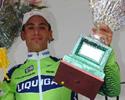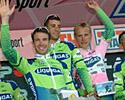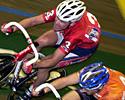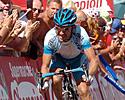Latest Cycling News for May 16, 2007Edited by Gregor Brown Nibali - young power to strong Liquigas team
22 year-old Vincenzo Nibali is adding a kick to the Liquigas Giro d'Italia team. He was on target heading into the Corsa Rosa and proved so by winning the GP Industria & Artigianato and Giro di Toscana, May 5 and 6. The weekend of winning, aided by teammates Franco Pellizotti and Andrea Noè, put Nibali on the right foot for the team time trail in Sardinia. "The Giro started off very well," noted Nibali to La Gazzetta dello Sport on the rest day. "The team time trial win. The Maglia Rosa." Nibali is an oddity in Italian cycling in that he comes from Sicily. Most riders come from the regions north of Rome. "My family lives in Messina," he continued. "My dad, Salvatore, works for the city and my mom, Giovanna, works at a video rental shop. My sister, Carmen, 26 years old, has a photo-lab. I have a younger brother, 15, who races in the beginners' category - my father is his trainer."
Nibali made the transfer to an area rich in racing at an early age. "From the age of six, for ten months of the year, I lived in the house of my ex-directeur sportif, Carlo Franceschi, in Lamporecchio [Tuscany]." Roberto Corsetti, Liquigas' doctor, is impressed with Nibali's natural qualities. "He has three important characteristics; a good strength to weight ratio (5.9 watt/kg), around an 80 ml/kg VO2 maximum and a capacity to work with lactic acid levels high." Today, those characteristics could come into play when the riders face the 17-kilometre ascent to Montevergine di Mercogliano. "Di Luca explained the climb to me," he said. "He won it in 2001 but I think the most dangerous riders will be Damiano Cunego [won the stage in 2004 - ed.] and Riccardo Riccò, who, even as a junior, has always been unbeatable." Riccò will be on of Nibali's main competitors for the Maglia Bianca of best young rider. "I think I will be up front, with Danilo. If there is an occasion for me [in stage 4] then why would I throw it away?" (Read: Maglia Bianca returns to Giro d'Italia.)
Cyclingnews will cover the 60th edition of
the Dauphiné Libéré live
as of stage 4 on Wednesday, June 10, at approximately 15:00 local Europe
time (CEST)/ 23:00 Australian time (CDT)/ 9:00 (USA East). Matt Gilmore retires
Track rider Matthew Gilmore, of Chocolade Jacques-Topsport Vlaanderen, has had to retire at the age of 34 due to continued knee problems. Along with partner Etienne De Wilde, he won the 1998 World Championship and an Olympic silver medal in Sydney 2000 in the Madison. He also won a total of 17 Six Day races. In July 2006, Gilmore crashed in a race in Ninove, Belgium, breaking his femur. However, the worst damage was done to his right knee. The tendon was torn entirely through and there was a complex crack in the knee cap. He has had two operations on the knee, the last being in February of this year. His attempts to return to racing were cut short by chronic tendonitis and pain, and at last the doctors recommended that he retire rather than risk further damage. "This was a heavy blow for Gilmore, to have to end his career at this point,” said Team Manager Christophe Sercu to HLN. "He still wanted to go the 2008 Olympics in Peking." Gilmore, who was born in Gent, was the son of Australian track and Six Day rider Graeme Gilmore, rode with the Australian Institute of Sport track team in the early 1990s, before moving back to Belgium. He suffered another serious crash in 1998, shortly after wining the Worlds. A mechanic standing too close to the track in the Herning Six Day race in Denmark brought him down, leaving him with a broken shoulder, punctured lung, and internal bleeding. However, he was able to make a successful comeback. Basso in Germany prior to 2006 GiroEttore Torri has received evidence from the Bergamo anti-doping investigating attorneys, in association with the German officials, that Ivan Basso was in Germany on the eve of the 2006 Giro d'Italia. The parties are working on a drug trafficking case and, according to La Gazzetta dello Sport, there is evidence to support that Basso was together with Jan Ullrich and Eufemiano Fuentes in a Freiburg hotel before the departure of the three week race which the Italian won. It is expected that this morning, or tomorrow, that Paolo Ferraro of the Rome Justice department will include Basso's name with Michele Scarponi and Alessandro Kalc for the violation of anti-doping law 376/2000. This action appears to be in response to Basso's non-cooperation in his last visit with Italian Olympic Committee's (CONI) Ettore Torri. Yesterday, Torri noted to AP, "During the second questioning, he seemed willing to cooperate. ... Then, he was clearly approached not only by his defence lawyers, but sponsors and technical directors who have pushed him to backtrack." Ferraro is expected to summons a number of foreign riders from Operación Puerto, including José Enrique Gutierrez, second in the 2006 Giro, Santiago Botero, Marcos Serrano, Alberto Contador, Dariusz Baranowski, Sergio Paulinho and Sergio Ribeiro. Fuentes' sister, Yolanda, could also be summons regarding a possible role in transporting blood from Madrid to riders in Italy. Their summons is based on 'crimes committed on Italian soil' related to anti-doping law 376/2000.
Cyclingnews' recent coverage of 'Operación Puerto' May 18, 2009 - Valverde to start Catalunya Cyclingnews' complete coverage of Operación Puerto T-Mobile doctors deny chargesClinic names investigatory panelBy Susan Westemeyer The two doctors named by a former soigneur as having provided doping products to Team Telekom riders during the Tour de France 1996 have again denied the charges against them. Letters from Doctors Lother Heinrich and Andreas Schmid refuting the charges were released this week by the University Clinic Freiburg, which also announced a panel to investigate those charges. In his letter, Heinrich said that "the charges are not for me to be understood and do not have any basis." He added, that "As a doctor, it is my duty to maintain the health of my patients and to handle illnesses. ... For me to inject EPO or to provide it to masseurs to pass on, therefore does not come into question for me." Heinrich further noted that "as compared to other team sports, the pro cyclists train all around the world, usually at the place where their families live. They meet at races and training camps. Those are the only places where they are treated by the team doctors. That explains why daily health controls like by football teams, for example, are not possible." Schmid said, "I reject the charges made against me by the Belgian former soigneur. They have no basis in fact. I have never given athletes EPO or growth hormones, provided it to athletes or so-called soigneurs or sent an athlete a plan for the use of doping preparations, nor prepared such a plan." The University Clinic Freiburg has announced the members of an independent investigatory commission which will look into charges raised against Doctors Schmid and Heinrich. The commission will be led by Dr. Hans Joachim Schäfer, a judge with experience in medical matters. He will be joined by Prof. Dr. Wilhelm Schänzer, a sports scientist and head of the Institute for Biochemistry at the Deutsche Sporthochschule in Cologne, and Dr. Ullrich Schwabe, from the Pharmacology Institute at the University of Heidelberg. In addition, the commission wil be able to call on international experts such as Prof. Dr. Bengt Saltin of the Copenhagen Muscle Research Centre, Dr. Urs Meyer of the Biozentrum, University of Basel, and Prof. Dr. Peter Hemmersbach of the Hormone Laboratory of the University Clinic Oslo. The Medical Director of the Freiburg Clinic, Prof. Dr. Matthias Brandis, condemned doping in sport. "Especially the medical profession forbids the support of measures that damage human health and fairness in sport." However, he supported the two doctors, saying, "As long as there is no evidence supporting the charges, the presumption of innocence applies." Donati blasts CONI and UCIBy Susan Westemeyer Ivan Basso "is a pawn in a bigger game. It is a major mistake, to focus all the negative attention on the riders," according to Italian anti-doping expert Alessandro Donati. "You fall in the trap that the international sports system has set for years," he continued in a no-holds barred Interview in WELT magazine. "This system is set up so that so few people as possible are caught, and when someone is caught, then it is the athletes, but never trainers, sports doctors or those in charge of the system. It is a perfidious strategy, in which the media and governments are accomplices. They have helped to form a new generation in the sports system, which is dishonest and corrupt." Donati criticized the Italian Olympic Committee's (CONI) decision last fall to shelve the Basso investigation. "This superficial decision was made much too quickly. But it didn't surprise me, since it goes along with every else CONI has ever done. The Italian Olympic Committee has a strategy of minimizing and avoiding. "The dynamics of the recent weeks are a change from the usual tactics. I see that at least as positive. But together with Basso's interrogation, it now appears in a more doubtful light. Especially when the CONI attorneys called his statement a major step in informing on the scene, a self-serving, over-hasty step on its part, because he actually only provided minimal cooperation. "Basso's cooperation is so far disappointing and unbelievable. CONI's earlier actions now seem like a sham." He doesn't see much good in Basso's future. "The various public investigations in Italy, like in Rome and Bergamo, will force Basso and his entourage to bring some truths to light. I will say in advance that Basso, like other sport stars -- think of Jan Ullrich and Marco Pantani -- will be on their own. "Basso faces the risk of standing alone in the spotlight, while the leading figures who have corrupted this sport, will remain in the shadows. It is totally unbelievable to me that the national and international federations allegedly knew nothing of a network like Fuentes had, that was based on an enormous international network. If this network was so well known to the riders and managers, then how could it be unknown to the UCI functionaries?" He called for further work on doping tests, noting that "there is in fact a disparity in the development of tests for doping methods. The medical commission of the IOC [International Olympic Committee] is at a disadvantage to the introduction of new doping methods." He said, "The most important examples are EPO and HGH [growth hormones]. EPO appeared at the end of the 1980s -- and what did the IOC commission do? They asked Professor Francesco Conconi to investigate it! "There are only two possible ways to interpret that action: either the IOC was totally incapable of a critical analysis of the situation -- or the IOC was already too deeply involved in the doping system." Donati, former head of research and development for CONI, said that he is unable to see the Giro d'Italia as a sports event. "With the background of all my experience, I can't do that any more. I see the Giro d'Italia only with professional interest, because events like this are soiled by doping." Totschnig looks back
Professional cycling is in an "undesirable crisis," said Georg Totschnig, who retired the end of last season. "As an ex-pro and fan, I believe it will have a new beginning. My feelings say that things are looking up, that sport will be at a centre-point again." However, in an interview with sport1.at he said that things will improve "if absolutely everyone understands that something has to change." His suggestion is that "everybody who is involved in cycling, from organizers to team managers to riders should all sit down together at one table and work together for the common goal. When then happens, then the way out of the crisis won't be so hard." The 35 year-old also said that the current investigations have to move faster. "The situation shouldn't be artificially long and drawn out. They should come to their conclusions and basta." Totschnig had previously been a staunch defender of Jan Ullrich, but now says that "the facts look different now. But the whole situation has to come to an end. What does it help when evidence doesn't bring any action? The actual situation is difficult to judge. Here and there is circumstantial evidence, then nothing for a few weeks. ... Guilty or not guilty? The decisions have to be made faster in such an important matter." The Austrian, who last rode for Team Gerolsteiner, says that he has gained five kilograms since retiring last fall, and "sometimes" misses the sport. "I can't put the day-by-day pro routine behind me so quickly. I noticed it particularly during the Spring Classics - I would have liked to have been there. I would also like to train more to get into a good form. Right now I ride about three hours a day. If I were 25, I would seriously think about a comeback. But by and large I'm happy with my decision." (All rights reserved/Copyright Knapp Communications Pty Limited 2007) |

|
January 2009 |
Recently on Cyclingnews.com |




